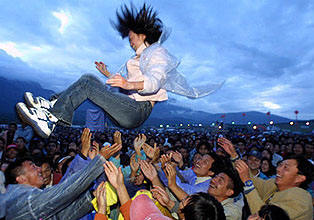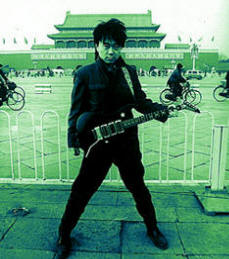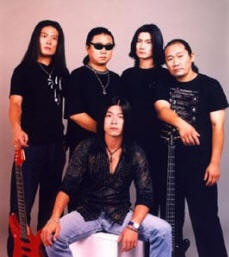This article was first published on CLUAS in November 2004
China Rocks
Chinese rock is stuck between generations...
 CLUAS.com's
man in China - Mark Godfrey - sends an engaging dispatch on the state of Chinese
rock music.
CLUAS.com's
man in China - Mark Godfrey - sends an engaging dispatch on the state of Chinese
rock music.
Four generations of Chinese rockers and fans celebrated Chinese rock'n roll's
20th anniversary on a stony desert in central China this August. Eighteen bands
played the three-day festival, billed as the "Glorious Path of China Rock'n'Roll."
Stacks of speakers blasted songs from a well-lit stone stage at the foot of Mount
Helan in Ningxia Autonomous Region. The well-policed concerts, near Ningxia's capital
of Yinchuan, drew pioneers like Cui Jian and Hei Bao as well as younger stars like
Zhang Chu and Luo Qi. There weren't any portaloos but fans camped and traders peddled
CDs and t-shirts, creating an atmosphere not unsimilar to well-established festivals
in the west.
The legendary Cui Jian organised China's first serious rock festival in 2002, with
a Woodstock-like rock-out on the mountains of southern Yunnan province. The undisputed
godfather of Chinese rock, and originator of the genre opened fifteen hours of shows
that ran over three days. Cui Jian, a classically trained trumpet player struck
the rallying cry for Chinese rock on May 9, 1986, when, still a relative nobody,
he jumped onto the stage at the One Hundred Chinese Stars Show, dedicated to the
International Peace Year, at Beijing Worker's Stadium. Dressed in army fatigues
and a cloak Cui Jian belted out the song that made him famous: "Nothing To My Name."
When he'd finished a stunned audience erupted in a standing ovation and overnight
China's youth were playing his songs on beat-up guitars in dormitories and dingy
bars. Cui Jian had set Chinese rock'n roll music on the road to respectability.
"In contrast to the gauzy romanticism of Chinese pop ballads, his dealt with
individualism and sexuality," writes American music producer Matthew Corbin
Clark, who's worked with Cui Jian since 1996. Following in Cui Jian's path, bands
like Tang Dynasty fused heavy metal with elements of Chinese traditional music,
taking their sounds to an enthusiastic Hong Kong crowds during a seminal tour of
mainland rock there in 1994.
 US
producer Matthew Corbin Clark followed the Chinese rock scene closely throughout
the 1990s, travelling to Beijing in 2000 to record a compilation album with the
best of the crop of bands appearing at that time. Spoilt for choice, Clark "?focused
on groups with a charismatic leader? I also sought singers who brought something
new to the use of Chinese language in song. Finally, I considered rhythm and groove
as a central criterion. I was actually very impressed by some of the young drummers
I saw in China -- and what a huge change that was from a decade earlier, when syncopated
rhythm was as alien a concept in China as McDonald's!"
US
producer Matthew Corbin Clark followed the Chinese rock scene closely throughout
the 1990s, travelling to Beijing in 2000 to record a compilation album with the
best of the crop of bands appearing at that time. Spoilt for choice, Clark "?focused
on groups with a charismatic leader? I also sought singers who brought something
new to the use of Chinese language in song. Finally, I considered rhythm and groove
as a central criterion. I was actually very impressed by some of the young drummers
I saw in China -- and what a huge change that was from a decade earlier, when syncopated
rhythm was as alien a concept in China as McDonald's!"
Today Chinese rock fans are spoiled for choice, with local CD shops featuring even
the most eclectic records from the West. Local rock fans "?can listen to virtually
everything that has ever been produced," says Clark. "It's remarkable to
see such a musical shift happening in so short a time."
Down in Ningxia meanwhile, kings of the first generation of Chinese rock Hei Bao
(Black Leopard), formed in 1987, see themselves as the epitome of the genre that
is Chinese rock. "We feel a stronger sense of responsibility when we are making
music now," says Hei Bao, the band's lead singer. "Seventeen years is quite
a long time for us. It's hard. But hardships drive creativity." Guitarist Li Tong
meanwhile is circumspect about the future of Chinese rock'n roll, "I'm more
interested in the process of its evolution. As for what it'll evolve into, so be
it?"
Clues as to Chinese rock's future came at the Midi Music festival in Beijing in
early October, when fans crowded to the International Sculpture Park to watch 45
bands play variants of rock music. The festival was organised by Zhang Fan, president
of the Midi School, China's first school of modern music and home to 170 students
of modern music and production techniques. This year's Midi festival was the best-attended
and most successful in Zhang's three years of staging the show.
 Cui
Jian however feels that Chinese rock'n roll has slipped into decline after a golden
period in the 1990s. "It was high in the sky. It was an unexpected prosperity.
Who knows when we can see another comeback," says the master of the art. Young
Chinese are no longer so taken by the riff of a rock guitar, flocking to stadiums
instead to see sweeter-sounding pop stars like Hong Kong's Karen Mok or Andy Leung.
Cui Jian meanwhile has raised eyebrows by replacing his Chinese manager with an
American and touring the West. His music today has an increasingly electronic bent.
Cui
Jian however feels that Chinese rock'n roll has slipped into decline after a golden
period in the 1990s. "It was high in the sky. It was an unexpected prosperity.
Who knows when we can see another comeback," says the master of the art. Young
Chinese are no longer so taken by the riff of a rock guitar, flocking to stadiums
instead to see sweeter-sounding pop stars like Hong Kong's Karen Mok or Andy Leung.
Cui Jian meanwhile has raised eyebrows by replacing his Chinese manager with an
American and touring the West. His music today has an increasingly electronic bent.
There are plenty of diehards though. "We are still living the underground life,"
says Zhang Qian, lead singer of C5, a local group that played the Ningxia festival.
In Beijing members of well-known rock bands can earn around RMB500 a night, but
in Zhang's hometown Yinchuan, dozens of rock bands struggle for gigs in the city's
few bars. "Our life is very difficult," says Zhang, not without a hint of
pride. Chinese rock's day isn't done.
Mark Godfrey
